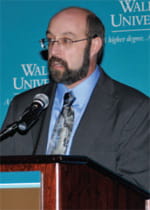
“In 1998, I was a newly minted respiratory therapist working in an intensive care unit where I observed very unusual circumstances: Streptococcus pneumoniae was taking the lives of a lot of people in their 30s. I asked a therapist with three decades of experience about this, and he commented that it happens every once in a while. I wanted to know when this was going to happen again and why. If we could predict it, people could get their vaccinations. They could protect themselves.
“The question remained in the back of my mind: Could we predict this? I had a question, but I didn’t know how to pursue the answer. I needed to gain research skills. Walden’s PhD program gave me the tools to answer the question. I had some very good classmates and teachers who showed me how to do research and how to refine my question.
“One of the bigger challenges was understanding the process of research. Then the problems became time and logistics. It was a very time-intensive process. You have to find the cracks in your life to fit it in. It takes a lot of support. I was very fortunate that my wife helped me balance the work, school, and clinical practice. But this was fun: to have a question find you, to get an answer to your question, and to make a difference for somebody. When it’s fun, it seems like your life is balanced.
“Powerful computers at the consumer level made it possible for a small team of us to take a very large data set and analyze it. I was surprised, but we found that there was no predictable pattern. I would have loved to find a pattern, but I’ve answered my question, and I’ve been privileged to work and speak with people I might not otherwise have encountered. The high point was my dissertation defense and having an answer to share with my community, having something to teach. Now, I’m writing a paper to disseminate the findings in professional journals.
“I’ve come to appreciate that I may not find patterns, and I have more respect now for randomness and chaos. In healthcare, we can’t predict all events, but we can help people prepare. Vaccination is a great effort, and my research puts more strength behind this. If anything, it’s made me an even stronger advocate for vaccination. You can’t wait for an epidemic to get vaccinated because you don’t know when it’s coming.”
Dr. Carl Eckrode is the program director for the respiratory care program at Mount Hood Community College in Gresham, Ore. He also teaches medical residents at local hospitals and volunteers with Multnomah County Public Health and Northwest Rock Medicine. He is the 2010 recipient of Walden’s Harold L. Hodgkinson Award.
Tell us about your Mission Possible at [email protected].



